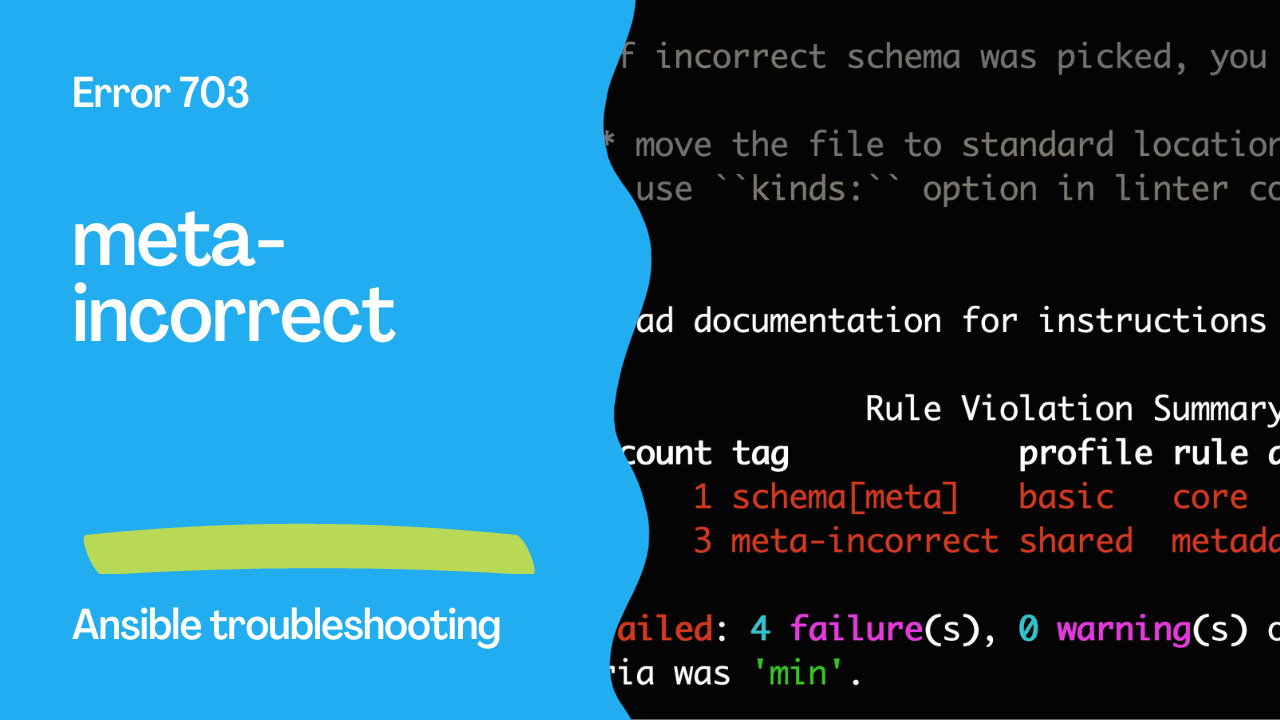Introduction
In the world of automation and infrastructure management, Ansible has emerged as a powerful tool for simplifying complex tasks. It provides an efficient way to manage and configure systems. When working with Ansible, organization and documentation are key, and that’s where metadata plays a vital role. Ansible Rule 703, “meta-incorrect,” ensures that your role metadata adheres to certain standards.
Understanding Role Metadata
Roles are a fundamental concept in Ansible. They encapsulate a set of tasks, variables, and templates, making it easier to organize and reuse automation logic. Each role can have associated metadata, defined in the meta/main.yml file. Metadata helps describe the role and provides important information about it.
The Significance of Rule 703
Rule 703, “meta-incorrect,” checks role metadata for fields with undefined or default values. It enforces the convention of setting appropriate values for specific metadata fields in the meta/main.yml file.
The metadata fields that should have defined values are:
authordescriptioncompanylicense
Rule 703 ensures that these fields are not left with placeholder or default values. Let’s explore why adhering to this rule is essential.
Problematic Code vs. Correct Code
Let’s compare problematic code that violates Rule 703 with the correct code that aligns with the rule’s recommendations.
Problematic Code
Metadata fields for the role contain default values.
meta/main.yml
---
galaxy_info:
author: your name
description: your role description
company: your company (optional)
license: license (GPL-2.0-or-later, MIT, etc)
Output
WARNING Listing 4 violation(s) that are fatal
meta-incorrect: Should change default metadata: author
role703/meta/main.yml:1
meta-incorrect: Should change default metadata: company
role703/meta/main.yml:1
meta-incorrect: Should change default metadata: license
role703/meta/main.yml:1
schema[meta]: $.galaxy_info.min_ansible_version 2.1 is not of type 'string'. See https://docs.ansible.com/ansible/latest/playbook_guide/playbooks_reuse_roles.html#using-role-dependencies
role703/meta/main.yml:1 Returned errors will not include exact line numbers, but they will mention
the schema name being used as a tag, like ``schema[playbook]``,
``schema[tasks]``.
This rule is not skippable and stops further processing of the file.
If incorrect schema was picked, you might want to either:
* move the file to standard location, so its file is detected correctly.
* use ``kinds:`` option in linter config to help it pick correct file type.
Read documentation for instructions on how to ignore specific rule violations.
Rule Violation Summary
count tag profile rule associated tags
1 schema[meta] basic core
3 meta-incorrect shared metadata
Failed: 4 failure(s), 0 warning(s) on 1 files. Last profile that met the validation criteria was 'min'.

Correct Code
---
galaxy_info:
author: Luca Berton
description: This role will set you free.
company: Ansible Pilot
license: GPL-2.0-or-later
As you can see, the correct code provides specific and meaningful values for each metadata field. This practice ensures that the metadata accurately describes the role and provides users with essential information.
Why Conform to Rule 703?
Adhering to Rule 703, “meta-incorrect,” offers several advantages for role management:
1. Clarity: Well-defined metadata fields make it clear who authored the role, what it does, and under which license it’s distributed.
2. Documentation: Properly filled metadata acts as a form of documentation for anyone using the role, making it easier to understand its purpose and origin.
3. Professionalism: When you provide accurate and meaningful information in your role’s metadata, it Playbooknstrates professionalism and responsibility in your automation projects.
Conclusion
In conclusion, Ansible Rule 703, “meta-incorrect,” encourages you to set appropriate values for your role’s metadata fields. This practice improves the clarity and documentation of your roles and reflects professionalism in your automation work. When sharing roles with the Ansible community or your team, well-structured metadata can make a significant difference in how your automation is received and utilized. It’s a small but impactful step in ensuring the reliability and effectiveness of your Ansible roles.
Academy
Learn the Ansible automation technology with some real-life examples in my
Udemy 300+ Lessons Video Course.

My book Ansible By Examples: 200+ Automation Examples For Linux and Windows System Administrator and DevOps

Donate
Want to keep this project going? Please donate
